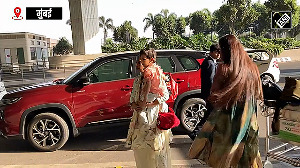Notwithstanding the Left parties' warning to the United Progressive Alliance government not to operationalise the Indo-US nuclear deal, the United States on Monday said it hopes to move forward and see the agreement to fruition.
"We don't have any specific comments on discussions within India about the agreement. This is a determination for Indians to make and we're going to be working with them to hopefully see this to fruition," acting State Department spokesman Gonzalo Gallegos told a press briefing.
He said it is an important agreement that the US believes will help India reduce its energy shortfall and will allow Indians to gain access to advanced technologies that will improve their daily lives.
"So we're working toward that end, coordinating with the Indians, coordinating with our Congress. And we hope to move forward on it," he added.
To a question on the implications to the nuclear deal should India test a nuclear weapon, Gallegos said, "I think [State Department spokesperson] Sean [McCormack] spoke to that the other day... it's on the record... I am going to go ahead and leave it at that. I don't really have anything different or additional to add to that."
Asked to clarify whether the US president has the option of waiving any consequences in the event of New Delhi testing a nuclear device, the acting spokesman once again pointed to what McCormack had said last week on the subject.
"I'll refer you back to Sean's comments on that. I know that he went on the record with that. I know that he's been standing by those comments and I'll just have to refer you to them," Gallegos said.
McCormack had on August 14 set off a storm in India when he said that in the event of India conducting a nuclear test, the US has the right the seek return of all material supplied under the 123 Agreement.
"As I understand it, the proposed 123 Agreement has provisions in it that in an event of a nuclear test by India, then all nuclear cooperation is terminated as well as there is provision for return of all materials, including reprocessed material covered by the agreement," McCormack had said.
Two days later, he had added: "A variety of officials from the US have said essentially the same thing, and that is that we are not testing and I don't you see advanced nuclear countries around the world testing. And certainly, we don't encourage other states to do that.
All of that understood, India's a sovereign country. And I think you're all familiar with the provisions in the 123 Agreement. And certainly, that provides the president options in acting, in the event that there is a test. But, you know, again, the whole issue, is India's sovereign, but we're not encouraging any states to test at this point," McCormack had said.
But India's envoy to the United States Ronen Sen had said Washington has clarified to New Delhi that its position remains that the civil nuclear cooperation will not be suspended automatically even if an atomic test was conducted.
"It has been reiterated to us that the US position remains as it had been articulated earlier at an authoritative level namely that India retains its right to test and the US retains its right to react," Sen had told PTI on Saturday.
"This reaction will not be one of automatic suspension of all cooperation," he said.
"The provisions of the 123 Agreement which reflect the most authoritative positions of both governments are, in any case, in public domain," Sen had said.






 © 2025
© 2025